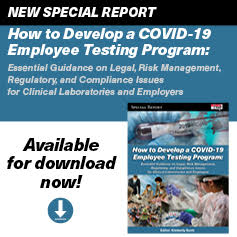New funding focused on improving COVID-19 testing in underserved communities may provide a unique opportunity for clinical laboratories
The National Institutes of Health (NIH) announced that it has awarded almost $234 million to help improve the access of COVID-19 testing to minority and underserved populations. The populations specifically identified by the NIH as being targeted in this grant include African Americans, Native Americans, Hispanics, Native Hawaiians, older adults, pregnant women, and homeless or incarcerated persons. The announcement was made Sept. 30, 2020.
According to the NIH press release, this program “aims to understand COVID-19 testing patterns better among underserved and vulnerable populations; strengthen the data on disparities in infection rates, disease progression and outcomes; and develop strategies to reduce these disparities in COVID-19 testing.”
The recent grant intended to benefit underserved populations is part of the NIH’s Rapid Acceleration of Diagnostics (RADx) initiative. The RADx program was specifically designed to facilitate and speed the development and implementation of COVID-19 testing technologies. This program aims to provide COVID-19 testing that is accurate, fast, easy to use, and widely accessible. These grants are the foundation of a new part of the RADx program called the RADx Underserved Populations (RADx-UP) program.
“Long-term community engagement efforts established by these researchers and programs provide an essential mechanism for discovering the factors that lead to COVID-19 related disparities,” Eliseo J. Pérez-Stable, MD, Director of the National Institute on Minority Health and Health Disparities, said. “These existing partnerships will serve as the foundation for swift implementation of interventions to promote greater health equity.”
NIH Director Francis S. Collins, MD, PhD, also weighed in on the new NIH grant. “It is critical that all Americans have access to rapid, accurate diagnostics for COVID-19, especially underserved and vulnerable populations who are bearing the brunt of this disease,” Collins, said in a statement. “The RADx-UP program will help us better understand and alleviate the barriers to testing for those most vulnerable and reduce the burden of this disease.”
RADx-UP Supports Data Collection Center at Duke University
 The NIH identified three primary components supported by the RADx-UP grants. These include:
The NIH identified three primary components supported by the RADx-UP grants. These include:
- “A collaborative clinical research network of existing large-scale programs that have adequate capacity, infrastructure and relationships with underserved communities.”
- “Research on the social, ethical and behavioral implications of these health disparities to inform the development and evaluation of testing programs.”
- “A coordination and data collection center at Duke University, Durham, North Carolina.” This center will provide support and guidance on administrative operations and logistics of the RADx-UP program.
The specifics on how funds will be applied for and awarded have yet to be made fully available, but they are expected to be available soon, according to an NIH statement.
Clinical laboratories may benefit from these funds, especially laboratories that provide care to underserved populations, including minorities, pregnant women, older populations, or incarcerated and homeless individuals. While the exact means of applying for these funds has not yet been released, the NIH does give the highest priority to existing networks with resources and relationships within underserved communities. As these funds become available, clinical laboratories may benefit from exploring potential partnerships with the NIH’s RADx-UP program to promote COVID-19 testing and support research into supporting these underserved groups.

—By Caleb Williams, Editor, COVID-19 STAT
Related Resources:
NIH to assess and expand COVID-19 testing for underserved communities
Clinical OMICs: NIH Grants $234M to Expand Testing for COVID-19 in Minority Communities







